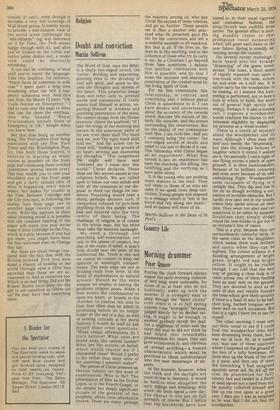Country Life
Morning drummer
Peter Quince
Putting the clock forward always makes the early-morning outburst of bird song more noticeable, for those of us at least who do not habitually wake up with the sunrise. It is strangely easy to sleep through the "dawn chorus" even when it is at full spring volume. I say "strangely" because, judged strictly by its decibel rating, it ought to be enough to awaken anybody except the deaf. Yet a neighbour of mine said the other day that he did not think he had heard this remarkable phenomenon for years. One can grow accustomed to, and oblivious of, almost anything—a human characteristic which must be precious to those unfortunates who live near motorways or airports.
At the moment, however, when the clock and the daylight are more or less in harmony, it would be hard to miss altogether the early Pipings and whistlings with which the birds signal a new day. The chorus is not yet at full strength, of course.But I notice that the blackbirds have now
joined in, in their usual vigorous and melodious fashion; the song-thrush was audible even earlier. The general effect is moving steadily closer to that prodigious vocal outpouring which will greet each dawn in the near future. Spring is steadily advancing across the country. On several recent mornings I have heard also the strange "drumming" of the green woodpecker. This noise, a short series of rapidly repeated taps upon a tree-trunk with the beak, echoes far and wide on a still day. It is rather early for the woodpecker to be nesting, so I assume this hammering is performed, not to bore a hole in which to build, but more out of general high spirits and energy. Perhaps it is also a mating call. I suppose a woodpecker would reinforce his claims to matrimonial eligibility by displaying his prowess as a wood-worker.
There is a touch of mysterY about the woodpecker and its ways. Although I often hear this bird (not merely the "drumming,' but also the strange bellows of laughter which it emits) I seldom see it. Occasionally I catch sight of one flying across a patch of open ground: it is then unmistakable, because of its brilliant colouring and even more because of its odd, undulating flight. Woodpeckers seem incapable of flying in .a straight line. They dip and rise in the air as though avoiding a succession of invisible obstacles. But I hardly ever spot one in the woods, where they spend almost all their time. They seem too alert and too suspicious to be taken by surprise. Doubtless they simply dodge round the tree-trunks to get out of an intruder's line of vision.
This is a pity, because they are extraordinarily colourful birds, in the same class as the kingfisher, which makes them look brilliant and exotic when they can be sighted. The colour scheme is a dazzling arrangement of bright green, bright red and bright yellow. It ought to be visible enough. I am told that the best way of getting a close took is to come across one of them feeding from an ants' nest on the ground. They are devoted to ants as an item of diet and readily forsake the trees which give them security if there is a feast of ants to be had; their long, barbed tongues serve them well on such occasions. But that is a sight I have yet to see for myself. The other morning I went into our little wood to see if I could find the woodpecker who had been drumming away there, but I was out of luck. So, as it turned out, was one of three squirrels whom I surprised on the ground at the foot of a lofty hornbeam. AU three shot up the trunk of the tree in a panic and then one of thera did something I had imagined squirrels never did. He fell off the tree. He plummeted for fullY twenty feet and landed in a flurry of dead leaves not a yard from me. He quickly collected himself and fled up the tree again at a great rate. I dare say I was as surprised as he was. But I did not find the woodpecker.


































 Previous page
Previous page